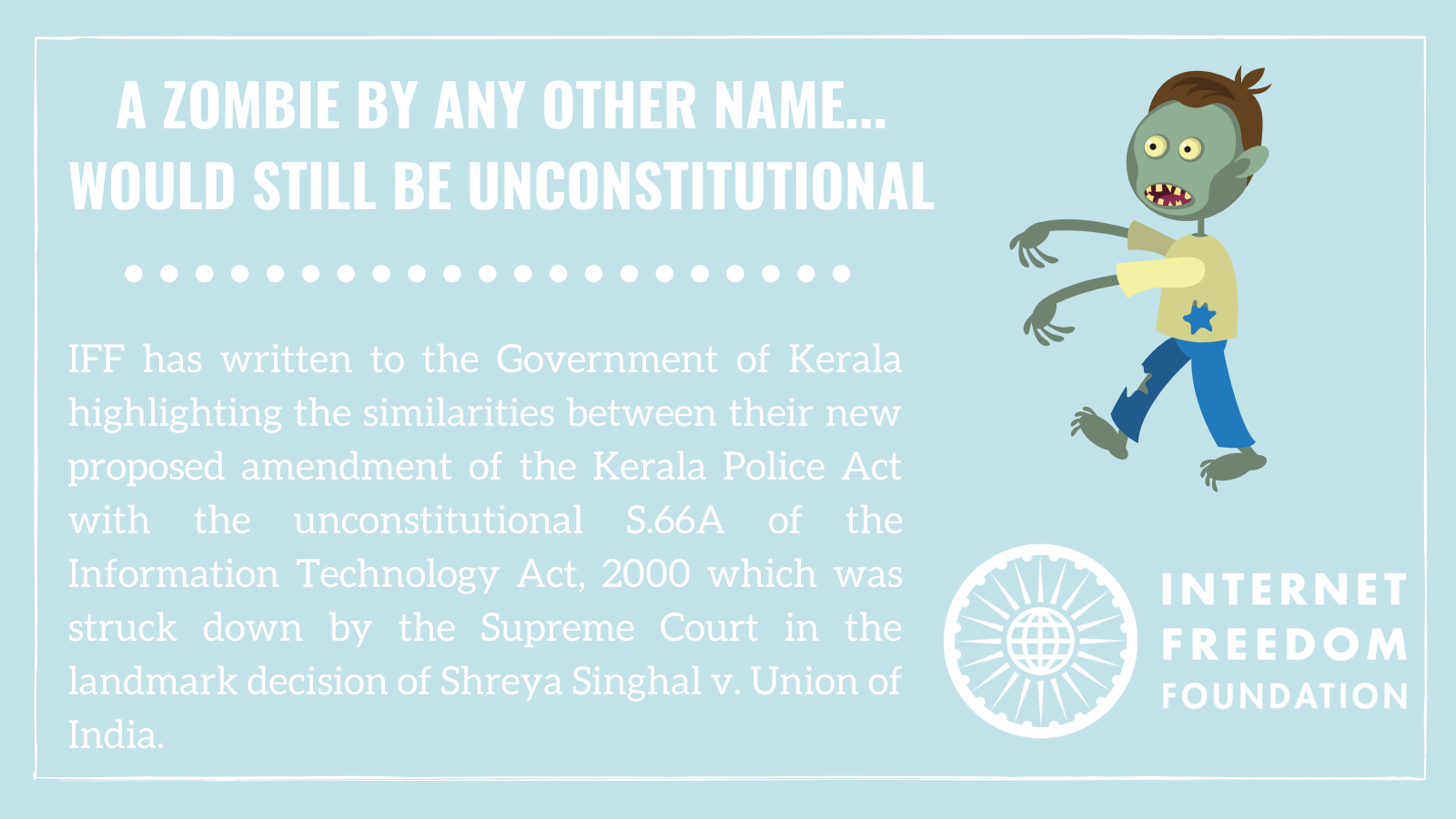
tl;dr
We wrote to the Government of Kerala cautioning them about the free speech risks that could arise from their proposed amendment of the Kerala Police Act, 2011. Our main recommendation was that any such amendment go through sufficient legal scrutiny and public consultation.
The Proposed Amendment
The Government of Kerala announced on October 21, 2020 its decision to amend the Kerala Police Act, 2011. The amendment aims to prevent cyber attacks against women and children through the introduction of a new provision which would state that
“anyone who produces content, publishes or propagates it through any means of communication with an intention to threaten, insult or harm the reputation of an individual will be punished with an imprisonment of five years or a fine of Rs 10,000 or with both”.
We note with concern that the text of this provision has not been made available on the official websites of the Government of Kerala and neither has it been put towards any public consultation. This is deviating from the norm of transparency and pre-legislative consultation.
It is also a matter of concern that this amendment is being introduced through ordinance which raises serious concerns about its validity. It is our opinion that any such amendment which curbs free speech on the internet needs to undergo sufficient legal scrutiny which can be achieved only if it is discussed and debated upon by the state legislature.
Return of the Zombie
The decision of the Hon’ble Supreme Court in the landmark case of Shreya Singhal v. Union of India (2013) 12 SCC 73 had previously struck down S.66A of the Information Technology Act, 2000 and S. 118(d) of the Kerala Police Act, 2011 for being violative of the fundamental rights guaranteed by the Constitution of India under Article 19(1)(a) which guarantees the freedom of speech and expression to Indian citizens. The Shreya Singhal decision highlights the need to ensure that overbroad restrictions on online speech are not used as a tool by the State to criminalise free speech on the internet.
“However, what has been said about Section 66A would apply directly to Section 118(d) of the Kerala Police Act, as causing annoyance in an indecent manner suffers from the same type of vagueness and over breadth, that led to the invalidity of Section 66A, and for the reasons given for striking down Section 66A, Section 118(d) also violates Article 19(1)(a) and not being a reasonable restriction on the said right and not being saved under any of the subject matters contained in Article 19(2) is hereby declared to be unconstitutional.”
The introduction of amended provision in question is concerning because of its similarity to the unconstitutional S.66A. The provisions suffers from a similar vice of being void for vagueness. The phrases as mentioned in the press report of the proposed Section 118 (A) mentions, “insult” and, “harm” are elastic and devoid of context and precise definition. Hence, the provision is in violation of the decision of the Hon’ble Supreme Court in Shreya Singhal v. Union of India and puts users of the internet at risk.
Our recommendations
- Introduction of any such amendment be done with full and complete transparency and not with haste. An important element is for the State Government to seek opinion on the proposed provision for compliance with the judgements of the Hon’ble Supreme Court from the State Advocate General’s office.
- We further recommended that a public consultation process be put in place to invite stakeholder comments from interested parties such as experts on online free speech, women’s rights activists and individuals/organisations that work at the intersection of these concerns.
- We urged for a fuller examination for creating an administrative and social toolkit in which legal responses play a role. Here, we recommended safeguarding free speech on the internet by moving away from criminalisation of online speech except under certain circumstances as contained in the International Covenant on Civil and Political Rights (ICCPR).
We are building a Zombie Tracker!
Section 66A of the Information Technology Act, 2000 was declared unconstitutional by the Supreme Court of India in March, 2015 in Shreya Singhal v Union of India. The Court declared that the provision was void ab initio i.e was deemed to never have existed on the statute books. The effect of this would be that all pending cases would be dismissed and no fresh cases would be instituted under S. 66A. However, in 2018, a research paper by Abhinav Sekhri and Apar Gupta highlighted that Section 66A was being still used for legal prosecutions all over the country. Taking note of the above-mentioned study, People’s Union for Civil Liberties (‘PUCL’), one of the original petitioners in the Shreya Singhal case approached the court in January, 2019 highlighting the study and applying for directions to ensure implementation of the Court’s decision. Inspite of repeated directions by the Supreme Court as late as 2019, our preliminary research shows that, S. 66A is still being invoked in fresh cases. Our preliminary findings were backed by a recent media report which highlights the continued invocation of S.66A. Further, we noticed that the mountain of pending cases including a charge under S.66A is ever increasing. Therefore, we are building a tool to track registered cases which include a charge under S.66A. We intend to use the data and insights generated from it to bolster our advocacy efforts to ensure that no fresh charge is registered under S.66A and pending charges under S.66A are dismissed.
The Zombie Tracker will be tracking cases which include a charge under S.66A at the district level, across 11 states: Andhra Pradesh, Assam, Delhi, Jharkhand, Karnataka, Maharashtra, Rajasthan, Uttar Pradesh, Tamil Nadu, Telangana, and West Bengal. The tracker will be collecting case data using the E-Courts application programming interface (API) , for the period 27th October 2009 to 15th February 2020.

